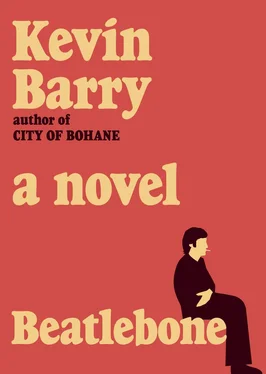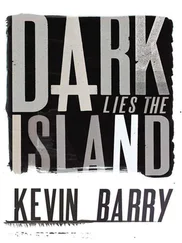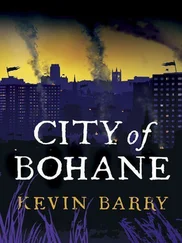He stayed up late to drink in the hotel bar. It was reported in the Mayo News that he played a tape recording of a new Beatles track called “Revolution” and announced it to the bar as the song’s first public airing. The stories of this second visit are legion and the truth has by now blurred into the apocryphal. There is in particular a legend in circulation that he sang Irish rebel songs in the bar that night and that a tape recording was made of this performance.
On the Sunday there was an outing by car and road bridge to Achill Island. A picnic lunch was packed for them at a place called the Amethyst Hotel by the edge of the village of Keel. The picnic was brought into the hills to a spot with a vantage view.
I have spoken to someone who knew someone else who was on Achill that day — a day of sudden showers — and who claimed to have found in the hills an abandoned picnic site — a blanket, a hamper, wineglasses — and the sight was surreal, the way such finery was laid down amid the rocks and the gorse: the fine linen, the fine glassware, the last of the cheeses and fruit.
They went to Dorinish by helicopter. A fisherman working on Clew Bay reported that he coasted by the island and saw a figure sitting serenely on top of one of the cliffs, gazing out to sea, and another figure, lower down, clad in black, a small lady or girl, shaking her fists madly as she was divebombed by terns.
The Great Southern has since been remodelled but it retains its John-and-Yoko suite, a room no bigger or grander than any of the others but with an especially fine view of Clew Bay.
——
A dusty window at the Amethyst Hotel showed its derelict interior and my own face, webbed and tired, as it stared back at me. I had slept only fitfully in the cave, and I was a little wiped, and now it was a greyer May day, and the Amethyst had the feeling of a bad dream revisited. It sat at the far tip of Keel, a strung-out village with a long, beautiful beach. It had been boarded up for some time. I hunched down close to the window and peered inside. Bits of broken furniture lay about, and old phone books, and shattered crockery — there was the sense of a place evacuated at a sudden rush. The Amethyst Hotel was sinking with every moment deeper into its dereliction and fading out of time—

I went around the back and forced a door — it gave easily — and I went inside.
The hotel was built in the late 1880s by John and Eliza Barrett and named for the seam of amethyst that runs through the hills nearby. It was later owned by a Captain Robert Boyd and considered to be at the higher end of the island’s accommodations. The London actor Robert Shaw owned it for a time in the 1960s and for a while it drew a louche crowd to Achill. The glamour of this incarnation did not persist. I believe I may have stayed in the hotel myself, as a child, in the summer of 1980, when we were rained off the nearby campsite.
I moved through the lobby downstairs. Clouds of dust came up as I walked by. I chanced the rickety stair. There were twenty-one bedrooms but in the final years of the Amethyst these had been turned into bedsits. I looked into some of the rooms and there were still sheets on the beds, and mummified food on the shelves. I found the room marked nine. I tried to push open the door but it caught on a scrunched wedge of damp carpet and for a moment it would not give, as if someone else stood behind the door and answered the push. But then with a quiet unearthly whoosh it opened, and I entered.
——
The documentary filmmaker Bob Quinn travelled to County Donegal in 1979 to record the lives and daily routines of the Atlantis Community. The resulting film, The Family , was considered too disturbing to be shown on Irish television, and it sat unseen for almost fifteen years, developing as it did a cult reputation.
The film shows the daily practice of the community, which revolved around primal scream therapy and furious ranted confrontations. The house itself is a large and damp-looking old seaside pile. It is painted with psychedelic swirls. There are symbols on its walls. The house ethos was to confront and to strip bare. In The Family , we see that this veers sometimes towards violent physical confrontation. Repression, of any sort, is taboo — the ranters let it all spill out. Watching the film, they seemed to me to be well intentioned but in a very difficult and fraught way, and their practice must have made for some long and trying nights.
In the mid 1980s, the Atlantis Community left Donegal and relocated to the interior of a Colombian jungle. They are still out there, and they deserve proper notation in the as yet unwritten radical history of the west of Ireland.
——
There was also at large in the 1970s a community of souls said to be shy to the point of muteness — as shy as small birds. They dressed in Victorian clothes. They varied their location between the counties of Mayo, Sligo and Donegal, and they would be seen among the hedgerows, and on the beaches, in white flowing blousons and in breeches, and in high polished boots, in frock coats and stovepipe hats, and they did not speak to the locals ever — not a word — but smiled, ever warmly, when they approached as strangers, and then passed by again, as a scent on the air passes by.
But it was the case increasingly as the decade aged that such esoterica in the Irish west was not uncommon and it quickly got to the point where it could be left unremarked. By the late 1970s, these odd communities had been coming to settle for the best part of a decade. Among the first to arrive, as far as these phenomena can be reliably documented, were the Diggers.
——
Early in 1971, John Lennon summoned Sid Rawle to the offices of Apple Records in London. Rawle was written up in the English press at this time as the “King of the Hippies.” He was involved with setting up alternative communities in the rural fringes. He was among the first of a type that would later be characterised as “New Age Travellers.” Lennon offered Rawle the custodianship of Dorinish Island. He wanted to find out if a battalion of freaks could thrive cut off from the mainstream and from mainstream values. Rawle accepted the offer and began to spread word around likely London enclaves of an imminent voyage. A group of eighteen adults and a baby was conscripted. The plan was to make a six-week summer camp on the island and evaluate its feasibility as a long-term base for free living.
The Diggers landed on Dorinish Island in June 1971.
——
The window of the room marked nine at the Amethyst Hotel was cracked, and a breeze came through from the May afternoon and sang about the room as a low, eerie, strung-out keening. I sat on the single bed that was in the room, its mattress damp and foul-smelling, and I closed my eyes and listened as closely as I could to what might be heard in such a room, at such a time and in such a place. The world was full of sighs, and the sea moved outside and the wind caught in a shelter break of trees and the sea searched out the crannies of the coast with the tip of its green tongue. The seabirds travelled and called. Outside the room then I heard footsteps but it could not be. I closed my eyes; my heart raced; I heard footfall. It moved as a slow shuffling across the old boards out there, and back again, and forwards again — one-two-three, one-two-three — and I could hear above it all the breath-of-sea — one-two-three, one-two-three — and the footsteps moved, as though two pairs moved in a slow, waltzed rhythm, and it was a May afternoon, again, and time moved hardly at all in the room marked nine at the Amethyst Hotel.
Читать дальше













